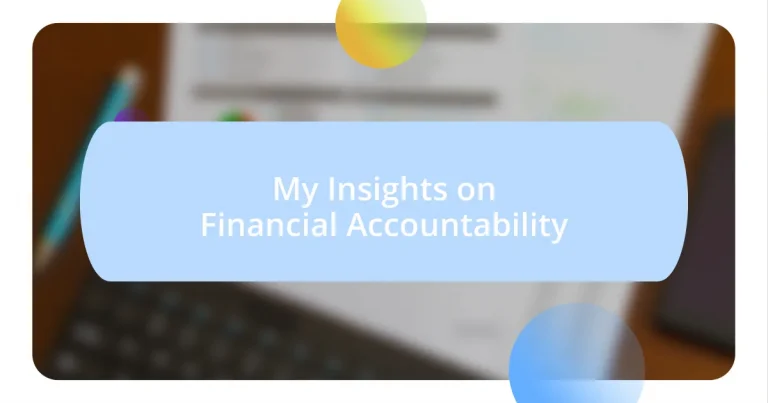Key takeaways:
- Financial accountability involves tracking expenses, maintaining transparency, and setting clear goals to foster better decision-making and trust.
- Regularly reviewing financial progress and creating a budget empowers individuals to take control of their finances and make informed choices.
- Utilizing tools like budgeting apps and expense tracking software can enhance financial accountability and provide valuable insights into spending habits.
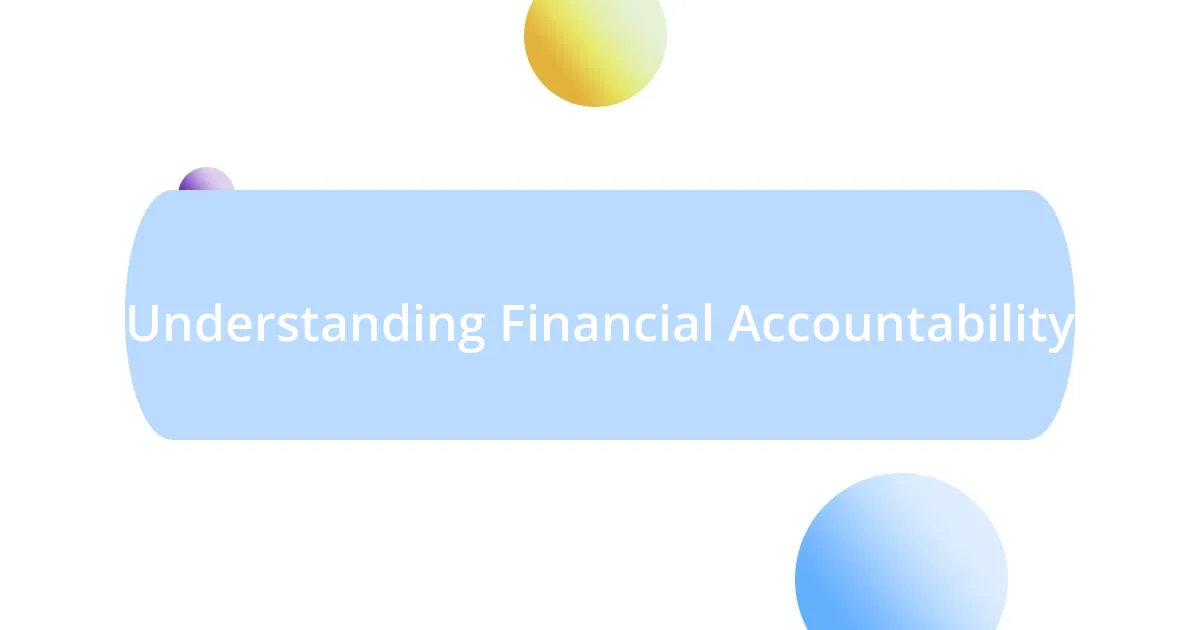
Understanding Financial Accountability
Financial accountability is essentially the practice of taking responsibility for managing finances effectively, ensuring that every dollar spent is justified and tracked. I remember my first job; I was amazed by how quickly my expenses crept up when I wasn’t vigilant. Have you ever looked at your bank statement and wondered where all your money went? That feeling can be both alarming and enlightening.
At its core, financial accountability is about transparency and integrity. When I made it a habit to regularly review my spending versus my budget, I felt a sense of control that was empowering. It’s like discovering I had a new superpower; I could decide my financial future, rather than letting financial chaos dictate it. How often do you reflect on your own financial habits?
Embracing financial accountability also fosters trust, not just with yourself but with others, whether it’s family or stakeholders in a business. I learned this the hard way when a project I was involved in faced budget overruns – trust evaporated overnight. Can you imagine the impact that lack of accountability has on relationships? It’s a clear reminder that being open about finances builds not only security but also stronger connections with those around us.
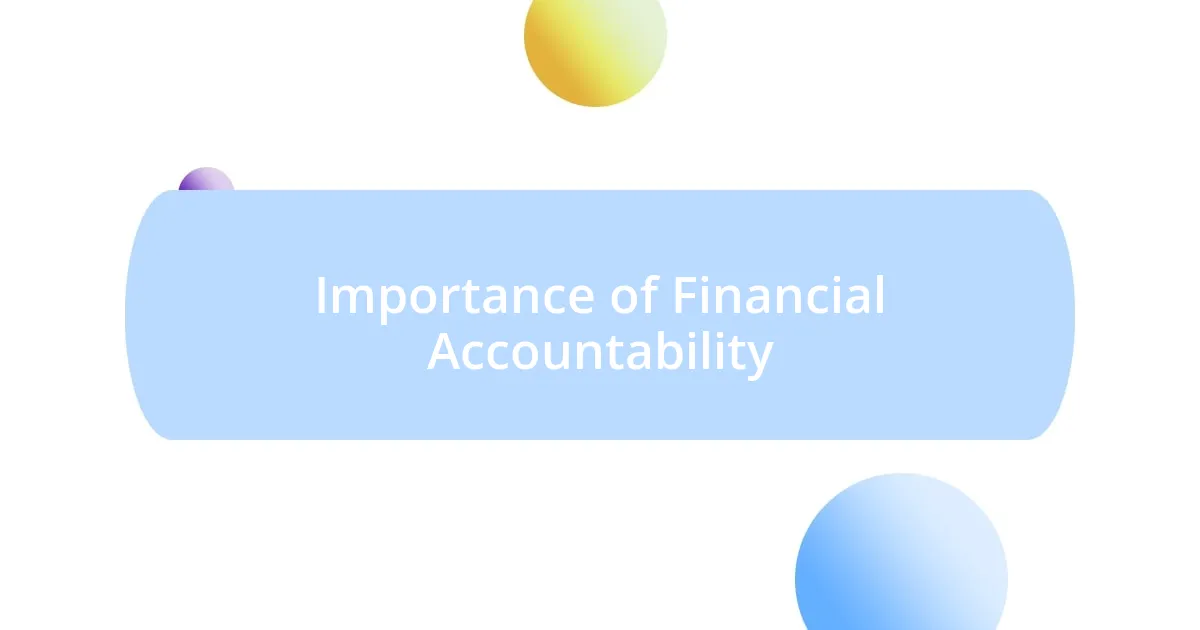
Importance of Financial Accountability
When it comes to financial accountability, the importance cannot be overstated. I recall a time when I neglected to track my expenditures, thinking it would all balance out in the end. Spoiler alert: it didn’t. I felt like I was sailing a ship without a compass, drifting aimlessly until I got hit by a financial storm. It’s a stark reminder that without accountability, we put ourselves at risk of unexpected setbacks and deep uncertainties.
Here are a few key reasons why financial accountability plays a crucial role in our lives:
- Promotes Better Decision-Making: Regularly reviewing finances helps us make informed choices rather than impulsive ones.
- Encourages Goal Achievement: When we hold ourselves accountable, we’re more likely to reach our financial goals, be it saving for a house or vacation.
- Enhances Mental Clarity: Knowing where every dollar is allocated brings peace of mind, reducing anxiety about the unknown.
- Builds Trust and Credibility: For businesses, transparency in financial practices fosters trust with investors and clients, crucial for long-term success.
- Facilitates Adaptability: Being on top of finances enables quicker adjustments when unexpected expenses arise, keeping us grounded in our financial journeys.
I often think about how different my financial situation would be had I embraced accountability earlier on. Sure, it requires discipline, but the clarity and confidence it brings are invaluable.
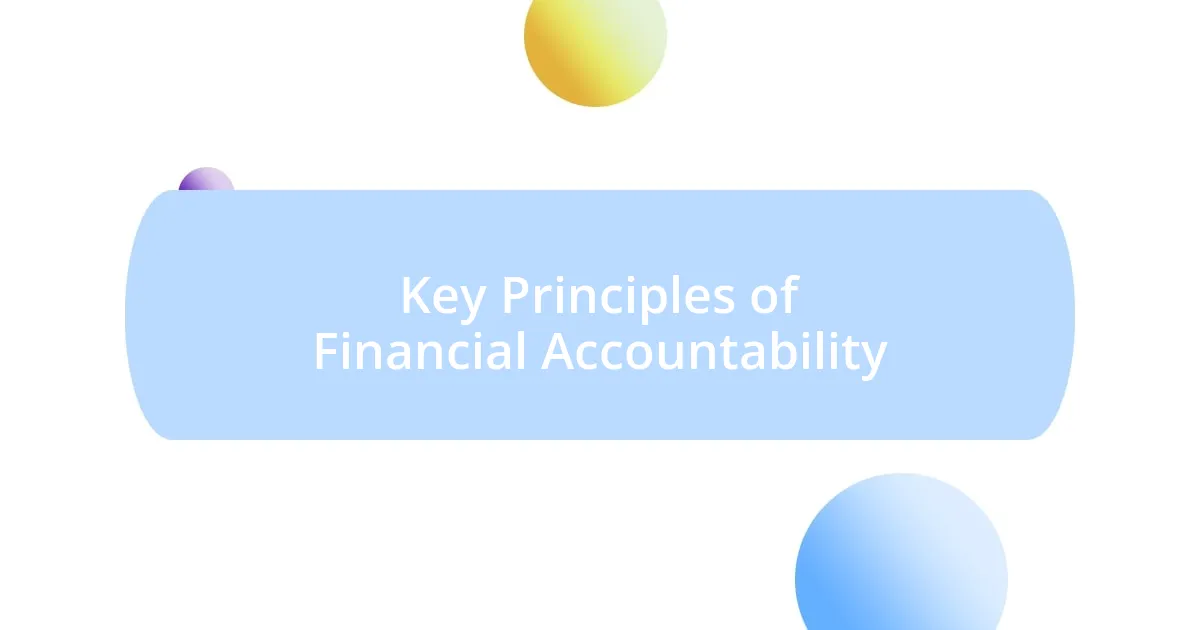
Key Principles of Financial Accountability
When we talk about financial accountability, there are a few principles that really stand out to me. One important principle is tracking expenses diligently. I remember a time when I started using a budgeting app. The first few weeks were a bit of a hassle, entering every coffee and snack I bought. But soon, I realized how enlightening it was to see my spending habits laid out like a clear map. Have you ever thought how beneficial it could be to unearth those hidden spending patterns?
Another critical aspect is being transparent with financial records. Transparency isn’t just for big businesses; it’s something I practice personally, too. For instance, when my partner and I decided to combine our finances, we shared everything openly. It was scary at first; I mean, who wants to reveal their financial missteps? But that openness brought us closer and helped us set shared goals. It served as a reminder of how transparency in finances can harness a sense of unity rather than division.
Lastly, setting clear goals is essential for maintaining accountability. I vividly recall planning a vacation that I had been dreaming of for years. I set aside funds every month and tracked my progress meticulously. The feeling of reaching that goal was like crossing the finish line of a marathon. By visualizing what I wanted to achieve and holding myself accountable, I made that dream come true. Isn’t it amazing how setting clear objectives can transform our financial journey?
| Key Principle | Personal Insight |
|---|---|
| Tracking Expenses | Using a budgeting app didn’t just organize my spending; it provided clarity on hidden habits. |
| Transparency | Being open about finances with my partner transformed our financial relationship into a united front. |
| Setting Goals | Planning for a long-awaited vacation taught me how accountability drives success. |
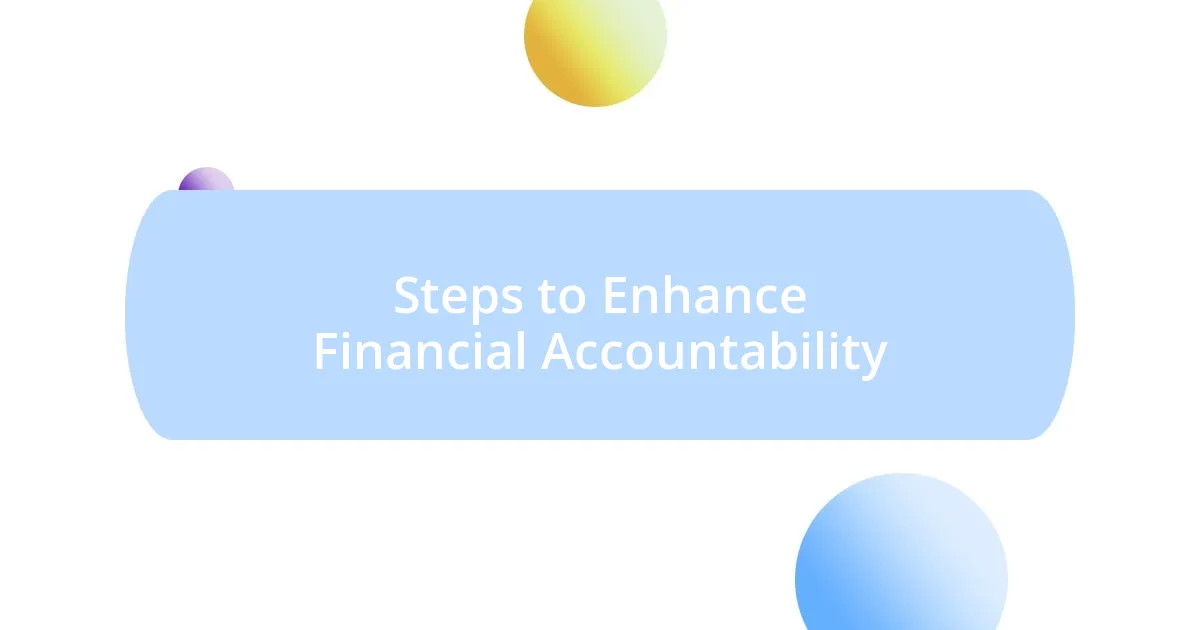
Steps to Enhance Financial Accountability
One effective step to enhance financial accountability is creating a monthly budget. I remember when I first tried to set one up; I felt a twinge of anxiety at the thought of restricting my spending. But as I dove into it, I found a sense of empowerment. Seeing my income and expenses lined up made me realize where I could cut back, which ultimately helped me save more. Have you ever considered how a simple budget could transform your financial landscape?
Another key action is regularly reviewing your financial progress. I make it a habit to sit down at the end of each month and assess how I did. Reflecting on my achievements and setbacks has become an invaluable ritual for me. Each review is like a mini check-in with myself, and it helps me spot patterns that might be crashing my financial goals. Are you taking the time to reflect on your financial choices?
Also, don’t underestimate the power of accountability partners. I recall a period when I teamed up with a friend who had similar financial objectives. We would share our goals and entice each other to stay on track by celebrating small victories. The camaraderie kept us motivated, and I discovered that having someone to share the journey with made the process much more enjoyable. Isn’t it incredible how a little companionship can keep us dedicated to our financial dreams?
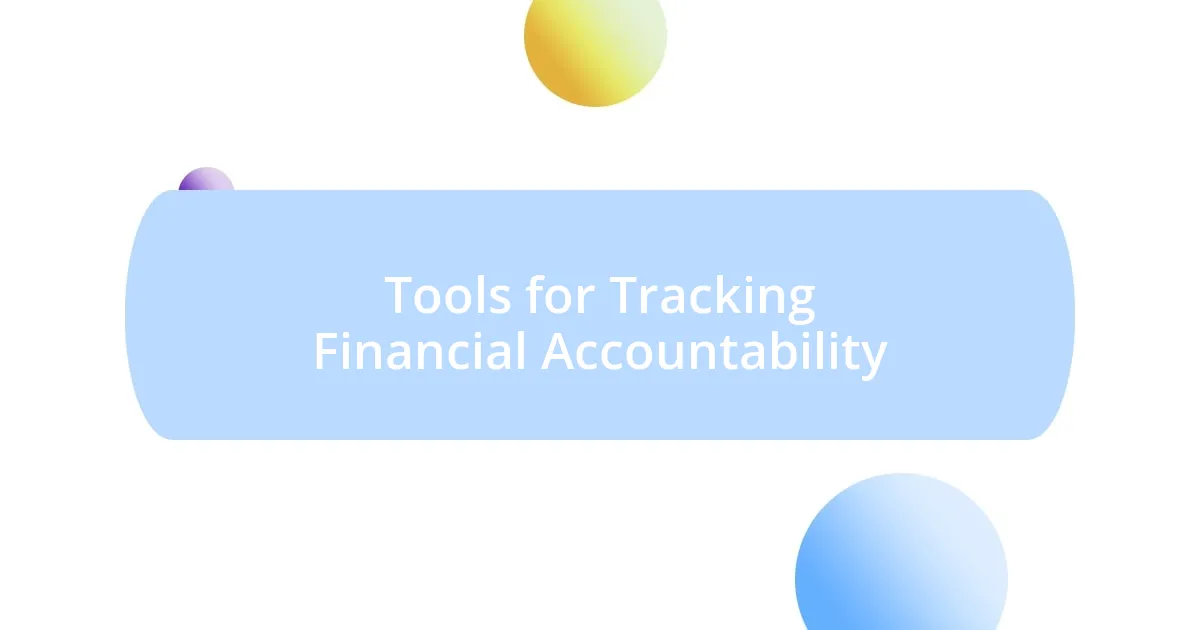
Tools for Tracking Financial Accountability
Tracking financial accountability can be incredibly effective with the right tools. For instance, I found that using a digital spreadsheet helped me visualize my expenses in a way that feels both manageable and precise. Every time I enter a new transaction, it’s like adding another piece to my financial puzzle. Have you ever felt the satisfaction of seeing everything come together clearly?
Then there are budgeting apps, which I can’t recommend enough. I remember downloading my first one and exploring its features—like setting spending limits. It was thrilling to see notifications pop up as I neared my budget cap. Those little nudges kept me mindful of my spending. Have you tried utilizing technology to make accounting more engaging?
Another tool worth considering is expense tracking software, which I’ve recently dove into. The moment I linked it to my bank account, it categorized my spending automatically. I was amazed at how this freed up my time while still providing me with detailed insights. Have you thought about how much easier tracking might be with some automation in your life? Each of these tools offers a unique set of advantages that can make the journey toward financial accountability not only easier but also more insightful.
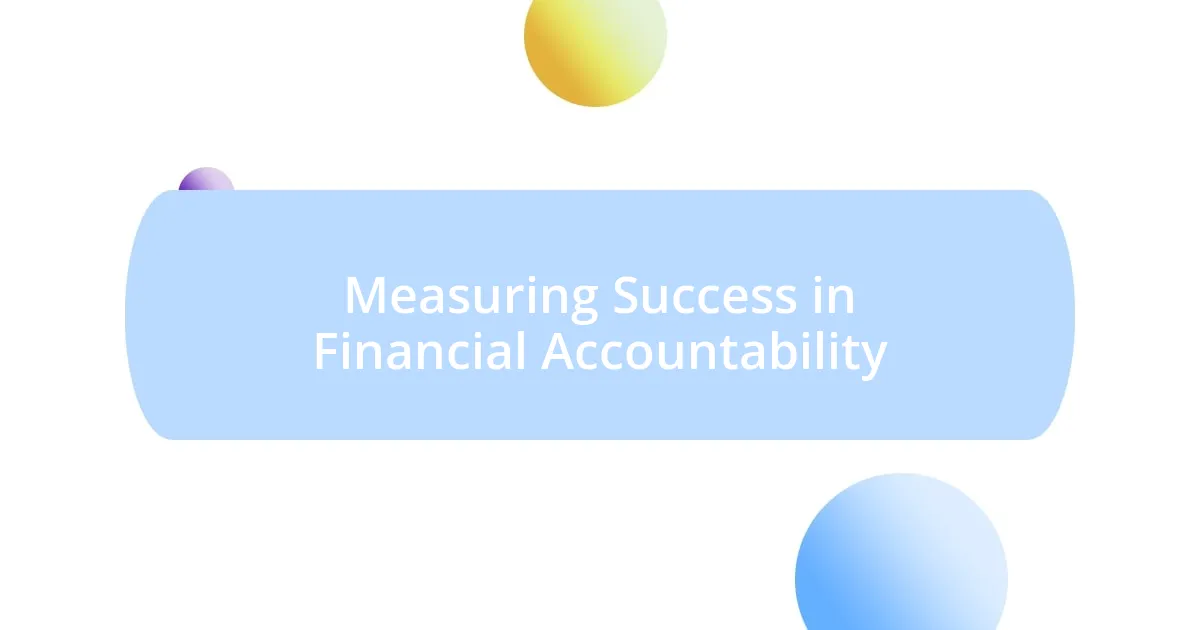
Measuring Success in Financial Accountability
Measuring success in financial accountability often goes beyond numbers; it involves set milestones and reflecting on one’s journey. When I started to quantify my savings goals, I recall feeling a mix of excitement and pressure. It was like setting a finish line in a race, and each time I reached one, it reignited my motivation. Have you ever noticed how celebrating small wins can shift your perspective on long-term goals?
Another significant aspect of success measurement is comparing your financial growth over time. I often look back at my monthly reports and marvel at how far I’ve come, especially during challenging periods. Noticing improvements feels like stepping onto a scale after a dedicated fitness routine; the numbers tell a story of perseverance and dedication. Have you checked your progress against your past self lately?
Finally, I’ve found that accountability also emerges from peer feedback. When I share financial updates with friends, their insights often provide a fresh lens on my progress and areas for improvement. I remember a moment when a friend’s critique of my spending habits helped me realize I was splurging on things that didn’t add value to my life. Isn’t it interesting how external perspectives can enhance our self-awareness and ultimately guide our financial decisions?












